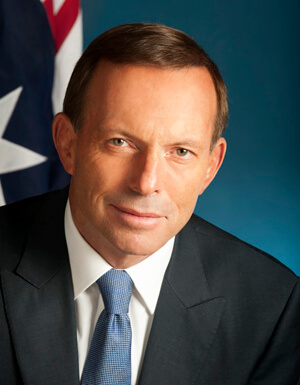Australian Liberal Party Prime Minister Tony Abbott opposes marriage equality. | PM.GOV.AU
Just days after same-sex couples began getting married in Canberra under a law passed by the Australian Capital Territory’s Assembly, the High Court of Australia, that nation’s highest bench, ruled that the territorial legislation was “inconsistent” with the federal Marriage Act of 1961 and was thus “of no effect.” The same-sex marriages contracted over the past few days are invalid, the court found.
At the same time, the High Court’s unanimous decision makes clear that the Australian Parliament does have authority, if it desires, to open up the status of marriage throughout the nation to same-sex couples.
Nation’s High Court says federal Parliament has exclusive authority
The federal government filed suit shortly after the territorial legislature passed the law, asking the High Court to declare it invalid. The court had refused the government’s request to block the start of marriages in Canberra, but quickly heard the case and rendered its verdict within a week. Despite the uncertainty of the marriages being upheld as valid, some same-sex couples did wed in the brief period when they could.
The December 12 ruling required the court to delve back into 19th century jurisprudence, in response to the argument by the Australian Capital Territory (ACT, a jurisdiction similar to the District of Columbia) that the federal Parliament’s constitutional authority to regulate marriage was limited to “marriage” as that term was known and defined by the nation’s 1900 constitution. According to that theory, the federal Parliament could regulate only opposite-sex marriages, giving discretion to ACT and the other Australian states to pass their own laws dealing strictly with same-sex marriages.
The court was unwilling to accept this argument, finding that the Constitution did not intend to freeze the federal government’s authority within the bounds of that term as understood in 1900. “Marriage,” the unanimous decision said, should be understood “as referring to a consensual union formed between natural persons in accordance with legally prescribed requirements which is not only a union the law recognizes as intended to endure and be terminable only in accordance with law but also a union to which the law accords a status affecting and defining mutual rights and obligations.” Australia’s Parliament has the authority to broaden its 1961 law to include same-sex marriages, the court found, just as it has made adjustments to the definition of the rights and obligations of marriage, for example by adopting laws on divorce and to equalize the legal status of women with men in marriage.
The court effectively rejected the notion that constitutional language is static in meaning, which provides some good news since it means there is no constitutional impediment to their seeking to amend the federal marriage law. On the other hand, it takes away a path to marriage equality through the ACT and the other Australian state governments –– which is how the issue has advanced in the US, at least until the federal Defense of Marriage Act was thrown out by the Supreme Court in June. The federal Parliament’s authority to make marriage laws is now established as exclusive.
Defenders of the ACT marriage statute argued that the federal Parliament had not purported to legislate on the subject of same-sex marriage so the states and territories should be free to do so, but the court responded that the federal Marriage Act, by inference, prohibited them, especially since it was amended in 2004 to bar recognition of same-sex marriages from outside Australia.
That amendment, the ruling stated, contained “the implicit negative proposition that the kind of marriage provided for by the [1961 law] is the only kind of marriage that may be formed or recognized in Australia.
The ruling did not come as a big surprise to marriage equality supporters, who vowed to go back to the Australian Parliament to seek an appropriate amendment to the federal Marriage Act.
“This is devastating for those couples who married this week and for their families,” Rodney Croome, the national director of Australian Marriage Equality said in a written statement. “However, this is just a temporary defeat.”
He added, “”We now have clear political and constitutional path forward for marriage equality, and call on the prime minister to grant his party a free vote on the reform.”
Prime Minister Tony Abbott, who leads Australia’s Liberal Party, opposes marriage equality and won election in September against the Labor Party incumbent, Kevin Rudd, who supports the rights of same-sex couples to marry.



































